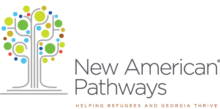Originally from Iraq, Asmaa had built a career as an academic at the Baghdad University College of Arts. Asmaa was a fixture at the university library where she worked, conducting research and helping to teach classes in the field of Library and Information Science with the goal of helping to instill in her students a shared sense of appreciation for the historical texts, artifacts, and other relics housed within the library that she describes as “treasures.”
But in 2003 war broke out in Iraq and her life was dramatically altered. Over the next several years, the sounds of students chattering on campus would be replaced by the sounds of bombs and ambulance sirens. Between 2003-2006, Asmaa lost her cousin and dear colleagues who served as professors and doctors at the university. Those historical and cultural treasures to which Asmaa dedicated her career toward preserving would also sadly become a casualty of war.
In 2006, Asmaa fled to Egypt with her family where she worked for the International Office of Migration, helping others who had similarly been displaced by war. Five and a half years later, she would get the news she and her family had been hoping for- an opportunity to be resettled to safety in a new country. After being resettled in 2011, Asmaa immediately began looking for opportunities to continue teaching and serving others and began volunteering around Clarkston and with students at the Global Village Project school for refugee girls. With the help of New American Pathways, she was able to get her degree in Library Science accredited and now works as a Community Outreach Coordinator for the Refugee Women’s Network (where she also volunteered for six months prior to obtaining employment.)
While Asmaa laments the loss of the treasures she worked to preserve in her home country, she acknowledges that the experiences she’s had working with refugees in Atlanta have served as their own kind of treasure in her life. Knowing first-hand how difficult it is to navigate life in a new country with a culture and language so different from her own, Asmaa finds boundless joy in helping the Arabic-speaking communities with whom she works, seeing many of them go on to become homeowners, supervisors at their workplace, and achieve so many personal and professional goals despite the obstacles they faced upon initially relocating.
When asked why the United States should resettle more refugees, Asmaa points to the zeal these communities have for life and their willingness to take the numerous and often difficult steps necessary to achieve a better life for themselves, their families, and their larger communities. She also points to the injustice of a stalling bureaucracy that separates families who are in critical need of life-saving resettlement. “Imagine yourself as a refugee. You are scared, looking for a safe place, and all you want is a good future…then you come here, you create a future for yourself. Now you want to see your relatives that you have not seen in years but you cannot. Imagine if these were your children. What would you want?”
Ask Congress: #WhereRtheRefugees? Here’s more information on what to say! It’s not too late to make your voice heard.
